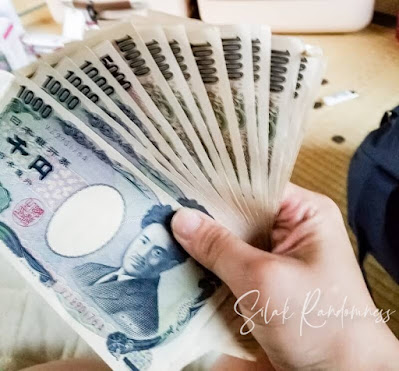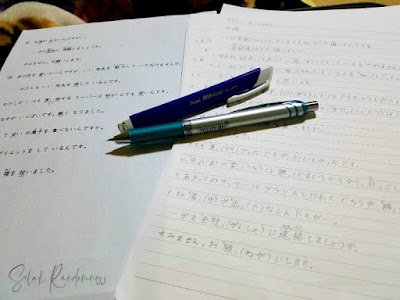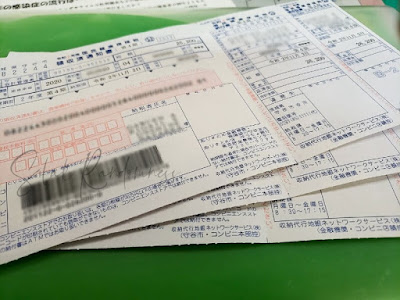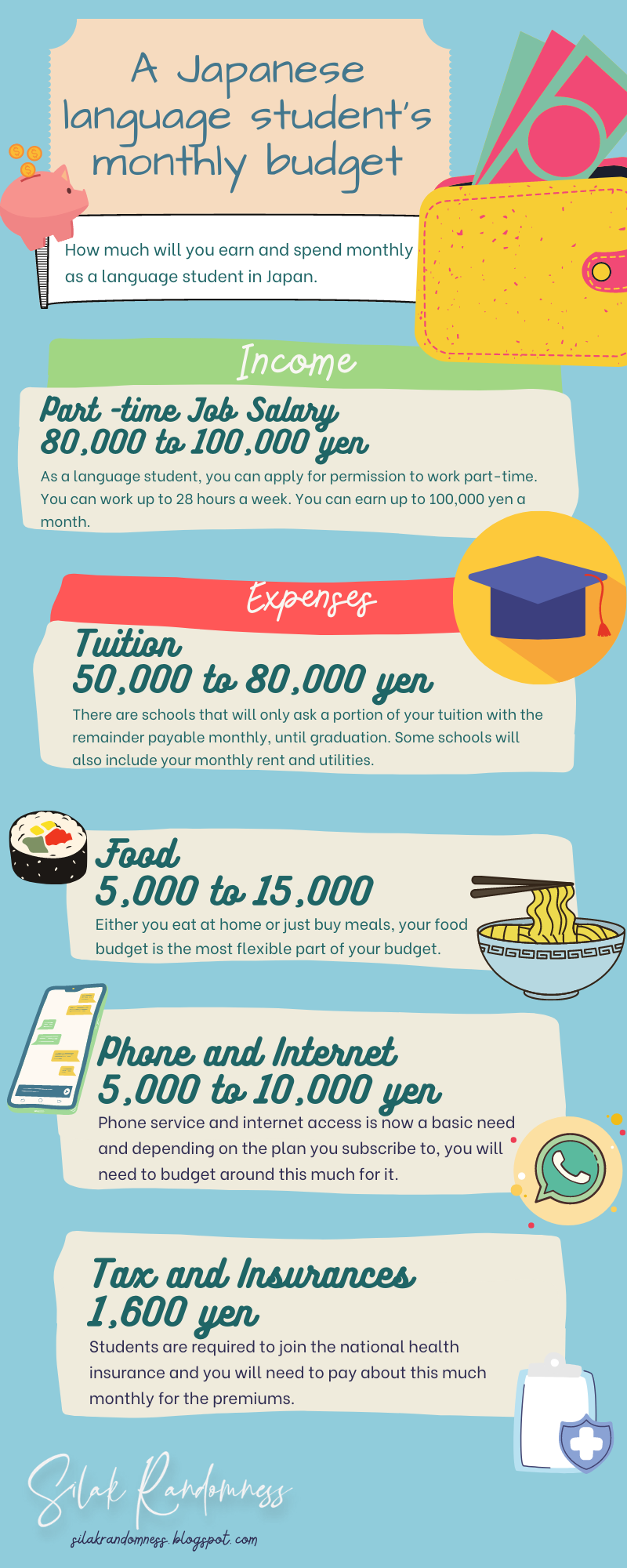Japanese Language Student's Monthly Budget
Welcome to Japan! You finally did it! You went through the long process of applying to be a Japanese language student, came up with the funding to pay for the initial payments, and you have finally boarded that plane to study and work in Japan.
Now, get ready to face your first challenge. How much will you be earning and spending as a Japanese language student?
When you're a student, chances are, you don't have much spending money because you only work part-time. Your main focus is to study and thus, you are only allowed to work 28 hours. But this also means you have to work with a budget to avoid mishaps like having to eat instant ramen for 2 weeks because you blew your money on something trivial.
Here's a preview as to how much I earned and spent as a Japanese language student.
Part-Time Job Salary
 |
| Money matters |
I studied in Oarai, Ibaraki. Much like other countries, the minimum wage will vary from place to place, and since Oarai is a little seaside town, the minimum wage is on the lower end of the scale. Back in 2016, the minimum wage was at 800 yen per hour. As of writing this in 2020, the current minimum wage in Ibaraki is at 850 yen per hour. Depending on your part-time job, your salary will vary a little bit, but on average, a part-time working student earns about 80,000 to 100,000 yen a month. You can also check my post about part-time jobs for students.
*Note: When you work part-time, you only get paid for the hours you work. You don't get paid leaves and other benefits. Although, you do get paid night differential if you work between the hours of 10 PM till 5AM.
Monthly Salary = 80,000 to 100,000 yen
Tuition
 |
| As a student, studying is your priority |
I studied at Oarai International Exchange Academy (大洗国際交流アカデミー). Since I enrolled with the 1.5-year program, my total tuition cost was about 1.5 million yen. The school requires 6 months' worth of tuition in advance before coming to Japan and is paid before the COE (Certificate of Eligibility) is sent to you. This amounted to roughly around 650,000 yen. My school's tuition is inclusive of dormitory and utility fees which made life easier budgeting-wise. The remainder of my tuition is paid in monthly installments of 50,000 yen.
Monthly tuition (inclusive of dormitory and utility fees) = 50,000 yen
Food
 |
| A simple, yet beautiful lunch. |
One thing I liked about living in Oarai is food. There aren't many fast food joints available in Oarai. The nearest McDonalds required me to bike about 3 km to get a burger and when you're a student, you just don't have that much time. So, most of the time we simply made our own meals at home which drove costs down. Occasionally, we would buy bento boxes that go on sale around 7 PM till closing time for most supermarkets. And, if you time your supermarket visit right, you can get bento boxes and other foodstuffs (like sushi) at 50 percent off. You can also stock up on cup ramen for days that you just can't be bothered to cook or go out. Your food budget is the most flexible part of your budget and I had months when I would only spend 5,000 yen on food.
Monthly food budget = 5,000 to 15,000
Phone and Internet
 |
| Communication is key |
Having a cellular service can be optional for some. When I was a student, I got my first Japanese phone about 3 months into studying. Some of my classmates even got theirs near graduation. Most students opt to just get a mobile wifi router and use the phones they brought with them to save costs. As I wrote in my post about the initial costs of coming to Japan, the initial cost can be a bit pricey, but the monthly bill would average at around 5,000 yen a month (even lower if you are below 25 years old). This 5,000 yen a month budget would afford you about 3GB of data. Calls will be charged on a pay-per-call basis. The telecommunications companies are coming up with better deals all the time so you can get an even better deal, but 5,000 yen would be a fair average cost for your phone bill. If your dorm offers wifi, it might already be included in the utility bill, so kindly check with your school if there is wifi coverage and if not, you can always negotiate to have one installed.
Monthy phone and internet bill = 5,000 to 10,000
Insurance, Tax, and Pension
 |
| Health is Wealth! Don't forget to pay for your health insurance. |
Everybody in Japan, regardless of nationality, are required to join the National Health Insurance(NHI) and for those above 20 years old, the Pension system. As for the National Health Insurance (国民健康保険), you will have to pay the premiums once you get the bill for it. It's usually cheap for students because you only work part-time. As for the Pension (日本年金機構), you can be exempted for the duration of your studies due to low income. The NHI will cost you about 16,000 per year, and if you choose to pay in monthly installments, roughly about 1,600 a month. You can budget your initial year's NHI premium to your initial costs so you don't need to think about it. Else...
Monthly NHI Premium = 1,600
In Summary
So, it is possible to save a little bit by working part-time and studying in Japan. Although these values fluctuate due to a lot of other factors like you catch the flu and had to stay home for a few days. Or if you had a sudden big expenditure or if you opted to go home for summer or winter holidays. If you're planning to do this as a means of livelihood and support family members back home, this might not be the route you should go.
Remember, if and when you come to Japan as a Japanese language student, your first priority is to study the language. This means that you have to pay your dues first before spending on anything else. If you really want to support your family back home, think of your time as a student as your "investment" for your future. Once you graduate and get a full-time job, sending money home will be a piece of cake (well, not really but at least you will be better equipped to).





How about yung house rent po?
ReplyDeleteHello! As for the house rent, it ranges from 20,000 to 50,000 yen depending on your housing agreement with the school. For Oarai International Exchange Academy, the room rent is included with the tuition.
DeleteThanks for commenting. :)
Silak
Hi. May agency po kayo na alam kung pano mag apply sa oarai?
ReplyDeleteHello!
DeleteRight now, I'm not aware of agencies that OIEA works with. Most of the time students will reach out directly to them, or they go to the Philippines to conduct seminars for those who are interested in enrolling. But due to corona, they haven't had the opportunity to go to the Philippines.
If you want you can message me on Instagram or Facebook and I might be able to assist you with talking to the school. :)